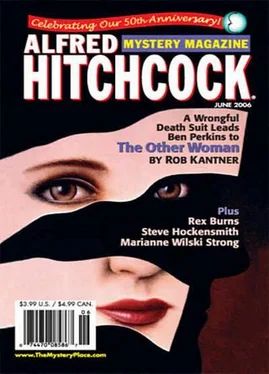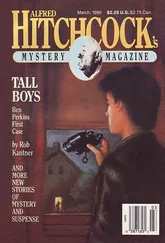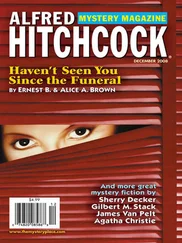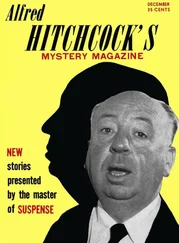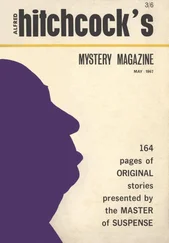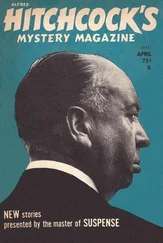Стив Хокенсмит - Alfred Hitchcock’s Mystery Magazine. Vol. 51, No. 6, June 2006
Здесь есть возможность читать онлайн «Стив Хокенсмит - Alfred Hitchcock’s Mystery Magazine. Vol. 51, No. 6, June 2006» весь текст электронной книги совершенно бесплатно (целиком полную версию без сокращений). В некоторых случаях можно слушать аудио, скачать через торрент в формате fb2 и присутствует краткое содержание. Город: New York, Год выпуска: 2006, ISBN: 2006, Издательство: Dell Magazines, Жанр: Детектив, на английском языке. Описание произведения, (предисловие) а так же отзывы посетителей доступны на портале библиотеки ЛибКат.
- Название:Alfred Hitchcock’s Mystery Magazine. Vol. 51, No. 6, June 2006
- Автор:
- Издательство:Dell Magazines
- Жанр:
- Год:2006
- Город:New York
- ISBN:0002-5224
- Рейтинг книги:5 / 5. Голосов: 1
-
Избранное:Добавить в избранное
- Отзывы:
-
Ваша оценка:
- 100
- 1
- 2
- 3
- 4
- 5
Alfred Hitchcock’s Mystery Magazine. Vol. 51, No. 6, June 2006: краткое содержание, описание и аннотация
Предлагаем к чтению аннотацию, описание, краткое содержание или предисловие (зависит от того, что написал сам автор книги «Alfred Hitchcock’s Mystery Magazine. Vol. 51, No. 6, June 2006»). Если вы не нашли необходимую информацию о книге — напишите в комментариях, мы постараемся отыскать её.
Alfred Hitchcock’s Mystery Magazine. Vol. 51, No. 6, June 2006 — читать онлайн бесплатно полную книгу (весь текст) целиком
Ниже представлен текст книги, разбитый по страницам. Система сохранения места последней прочитанной страницы, позволяет с удобством читать онлайн бесплатно книгу «Alfred Hitchcock’s Mystery Magazine. Vol. 51, No. 6, June 2006», без необходимости каждый раз заново искать на чём Вы остановились. Поставьте закладку, и сможете в любой момент перейти на страницу, на которой закончили чтение.
Интервал:
Закладка:
Alfred Hitchcock’s Mystery Magazine. Vol. 51, No. 6, June 2006

Shadow People
by Rex Burns
Constable Leonard Smith had been temporarily attached to the Broome Police Station for the purpose of locating a runaway white youth. The three-day search sent him on a thousand kilometer circuit of the monsoon-soaked Kimberley outback. Now, on this hot and rainy Monday afternoon, he splashed his well-used Toyota 4Runner down the Cape Leveque Road to report a successful outcome to Senior Sergeant Dougald.
Between walls of thick brush, the long stretch of red mud was mostly empty. Broome’s white population sought refuge from the rain in the town’s taverns, where pool tables and alcohol helped them ignore the steady drum on corrugated iron roofs. The coming of the Dry in autumn meant sunshine. It meant money and the new faces of increasing numbers of tourists. It meant talk of a world beyond the vacant line of the Indian Ocean or the equally flat horizon of the Roebuck Plains.
Most Aborigines — Yawuru and remnants of other skin groups — called the town “Rubibi,” and did their drinking under trees scattered in its small parks. Wet season or Dry, you could see them sitting, lying down, passed out, like shadows in the shadows. Shadows on the earth, shadows on the soul. Shadow people. That’s what crossed Leonard’s mind as he jounced toward a woman whose wooly hair was streaked with gray and whose cotton dress was painted to her skinny shape by rain to show that she wore no undergarments. She lurched drunkenly into the track and Leonard swerved, fighting the wheels’ slip in the mud.
Suddenly, he recognized her and pulled the Tojo onto the grassy shoulder. Rolling down his window steamed by the humidity, he called after the woman. “Miss Daisy — Bibi Daisy!”
The figure, swaying slightly in the warm rain, paused to stare back at the vehicle with its police decals half buried under mud. She was a distant cousin through Leonard’s mother’s family, and when he had been orphaned, she had gathered him among her brood until he was sent to the state home. Leonard still referred to her with the Yawuru word for his mother’s sister. He felt a spasm of guilt that his visits to her home had slowed to almost nothing. Now her bloodshot eyes bulged slightly as she tried to make out his face in the overcast gray light. “Leonard? You Leonard-the-copper?”
“Hop in — I’ll give you a ride home.” Her twenty or so kilometer walk up the Manari Road past Cape Latrille would take the old woman well into darkness, if she were sober enough to make it at all. Leonard could drive there and back in an hour or two, though he shouldn’t — S. S. Dougald expected his report directly. But the sergeant always preached greater initiative to the Aboriginal constables, and Leonard could say he took the initiative to check for vehicles stranded in the mud of the lonely road. She grabbed for the handle of the door and lurched in, bringing with her a musty smell of smoke, plonk sweat, and something indefinable but rooted in childhood memory. She sat without speaking and stared through the misty window screen. Leonard reversed and turned and headed back north. After a proper silence he said, “You come to town a lot.” It was the polite way of asking a question without asking a question.
A jounce or two more and the spray of wiry gray and black hair nodded. “Get money now.” Her black face split into a wide grin and she shrugged. “Every fortnight, jinjie bring money for me.”
The word wasn’t Yawuru; the woman used the Nyungar language for “ghost.” It was a trick to confuse the spirit and keep it away from her, since even a ghost that brought money could also bring harm. And, Leonard thought wryly, given that any money always went for plonk wine, it brought more harm than good.
He groped on the floor for his rucksack and pulled out the remainder of his ham sandwich. “You eat this tucker, okay?” She would not have wasted the money on food.
“Ah — okay — good boy. You copper but good boy anyway!”
The white teeth, gapped here and there by empty spaces, flashed again as she tore into the sandwich.
Leonard turned up the air-conditioning and churned into the deeper mud of the Manari track. After a while, the woman snored, her breath spreading the odor of sour wine and her head thumping occasionally against the window. When the vehicle lurched onto a path marked faintly across the grassy verge, the woman awoke.
“My house now, eh?” Her lips smacked with dryness as she blinked and stared out. “Okay to let me out here.”
“It’s a ways yet.”
“Too much trees down. Big wind come — no track now.”
“No worries. I’ll take you as far as I can.”
The grayness thickened with enveloping brush. Leonard eased the lurching vehicle past the scrape and drag of branches. The dark blur of a kangaroo bounded away into the shrub. Ahead, where a fallen tree blocked the road, a grassy patch offered space to turn around. He pulled up and shut off the motor.
“Come on, Bibi. I’ll walk you home.”
“No need. I be okay.”
“You do me this favor, Bibi. It’ll make me feel better to see you home safe.”
The bloodshot eyes stared at him for a long moment. “You part waijela — jinjie no fuss up waijela, so okay.”
Waijela — an Aboriginal pronunciation of “white fella.” He wasn’t certain that jinjies respected that half of him. But his general ignorance of Aboriginal beliefs seemed to protect him from the many dangers of the spirit world — or so he liked to believe.
They stepped over the thick trunk of the fallen tree, following a long bend toward the old station house. It had reverted to Daisy when the Native Title Claimants Act returned Aboriginal land illegally seized by squatters. The square, single-story cottage had deep verandas formed by the overhang of the rusty iron roof. Beneath the verandas, a scattering of tattered folding chairs brought memories to Leonard of the sense of family he had briefly experienced here. Thick bougainvillea vines writhed up the posts to form a living fringe along the veranda’s edge. Half a century ago, the squatter who originally seized the land planted them and the surrounding grove of palm trees that made the grounds parklike. The trees, the cottage, and its name — Wignall Station — were all the squatter left when he disappeared, some said south to Perth, others said north to Darwin. Leonard remembered the clerk at the state home enrolling him as “Smith, Leonard (mix) from Wignall Station, near Barred Creek.”
Leonard gazed around. “You live alone, now.” Through a screen of mulga, he glimpsed the sea where he used to roam on the sandy beach below the bluffs.
She nodded. “Babas all gone.” Her long fingers flapped at the surrounding world into which her four children had wandered. Her bare heels clumped up the two wooden steps and across rattling porch boards. She seemed more sober now, almost on guard. When she opened the unlocked door it was with caution, and she paused to look around the small front room before crossing the threshold.
Here and there, bare stone blocks showed through missing plaster. Cracked glass in the windows had been mended with cellotape or replaced with squares of pressed wood. The fireplace mantel showed black where the chimney had ceased to draw properly. But the sooty cooking pans were stacked clean and neat on the stone of the hearth, and the bare floorboards were swept. Both corners of the fireplace were broken, the structure stepped where bricks were missing. Through an open door that led to the single bedroom, Leonard could see a fresh gouge in the wall. Three large, squared stones sat crookedly without masonry, and on the floor beneath was a fresh scatter of cement dust.
Читать дальшеИнтервал:
Закладка:
Похожие книги на «Alfred Hitchcock’s Mystery Magazine. Vol. 51, No. 6, June 2006»
Представляем Вашему вниманию похожие книги на «Alfred Hitchcock’s Mystery Magazine. Vol. 51, No. 6, June 2006» списком для выбора. Мы отобрали схожую по названию и смыслу литературу в надежде предоставить читателям больше вариантов отыскать новые, интересные, ещё непрочитанные произведения.
Обсуждение, отзывы о книге «Alfred Hitchcock’s Mystery Magazine. Vol. 51, No. 6, June 2006» и просто собственные мнения читателей. Оставьте ваши комментарии, напишите, что Вы думаете о произведении, его смысле или главных героях. Укажите что конкретно понравилось, а что нет, и почему Вы так считаете.
